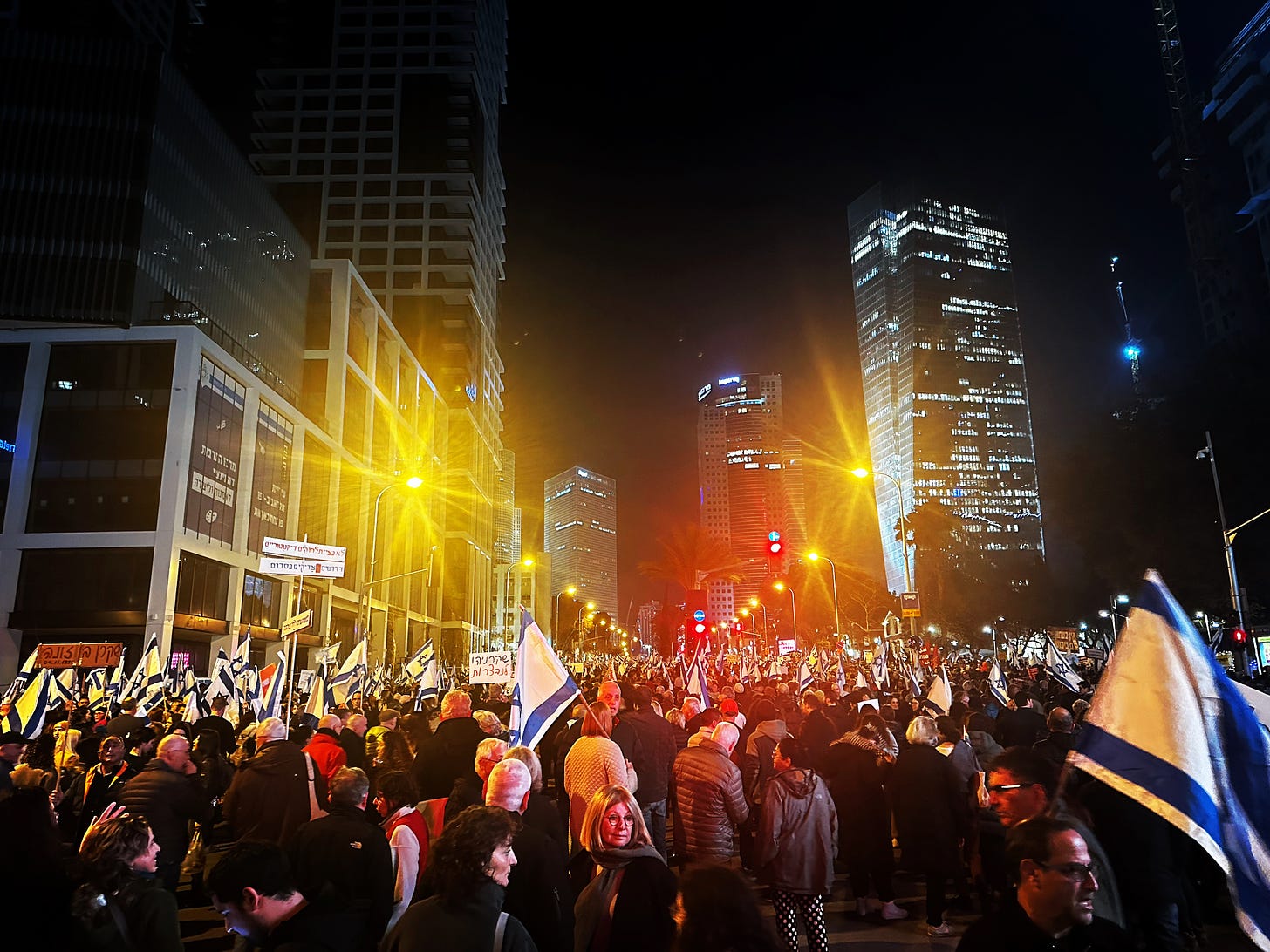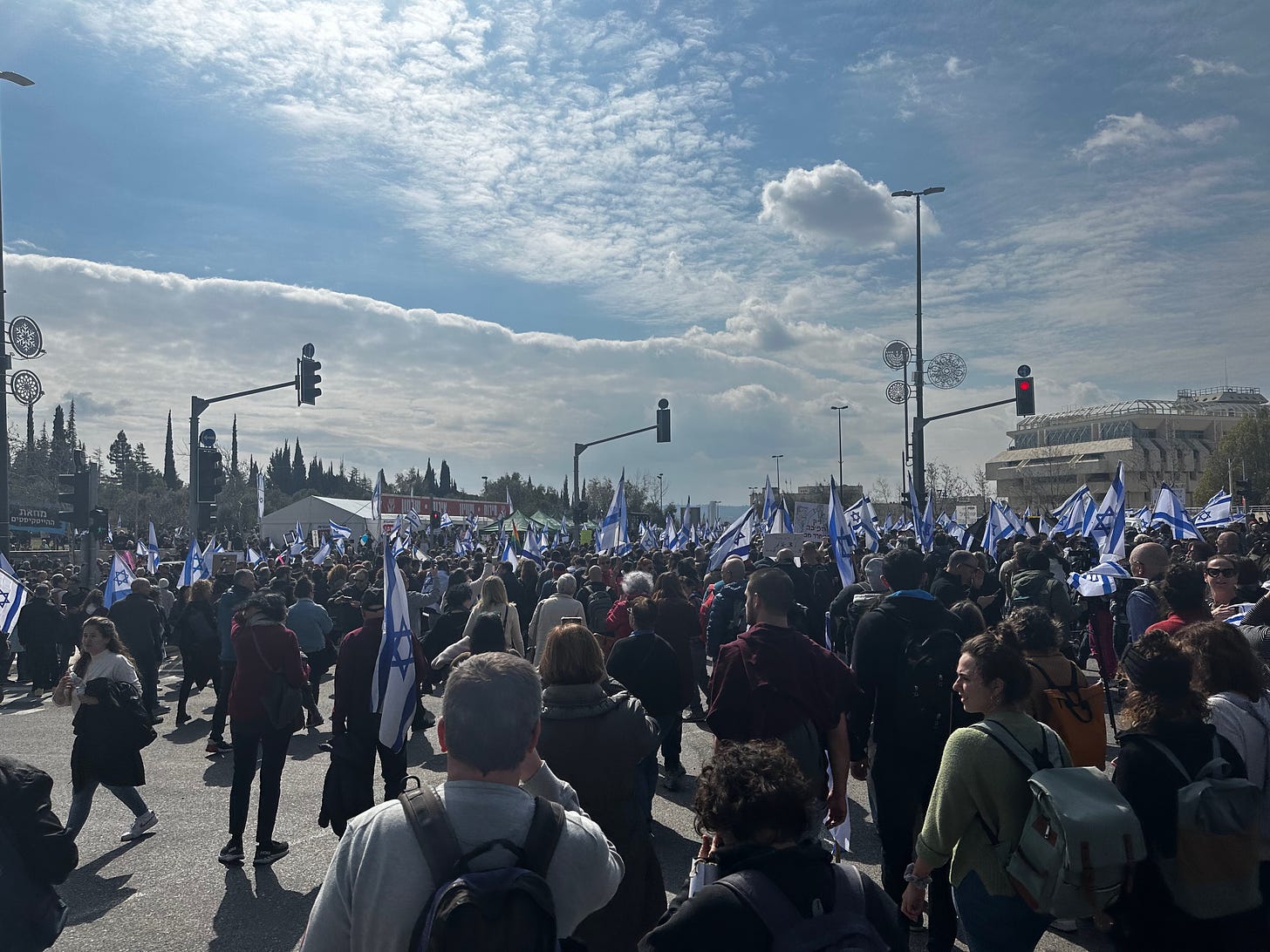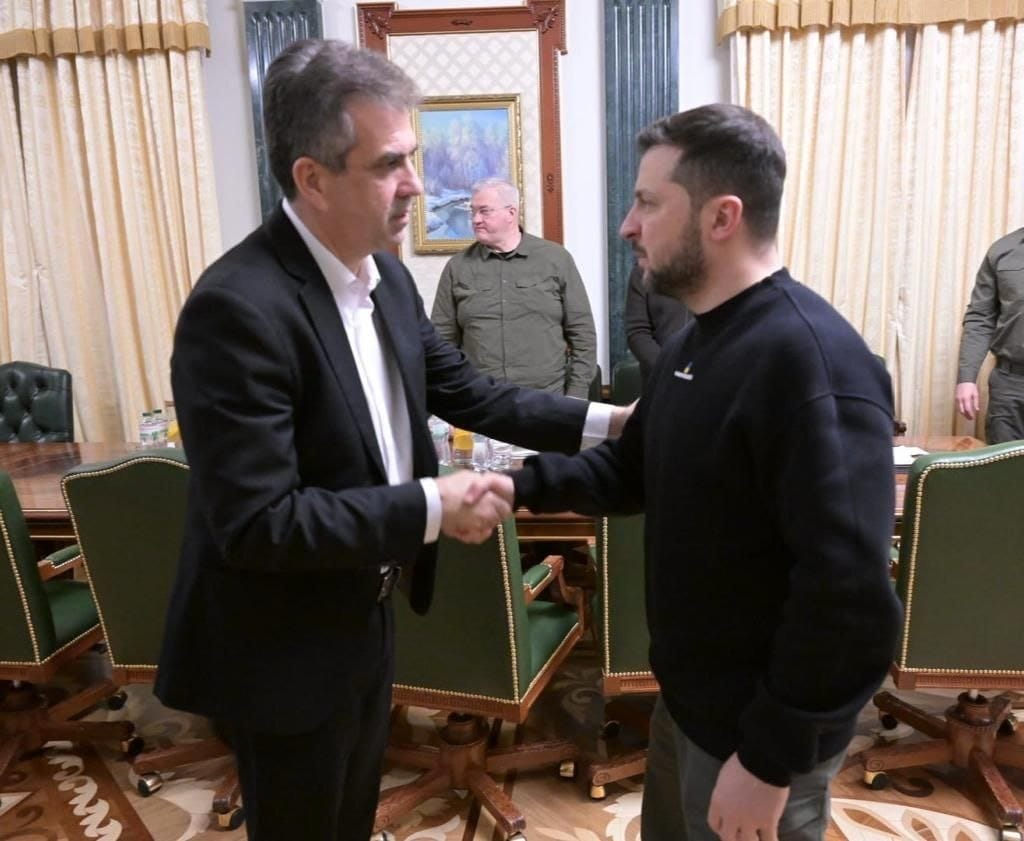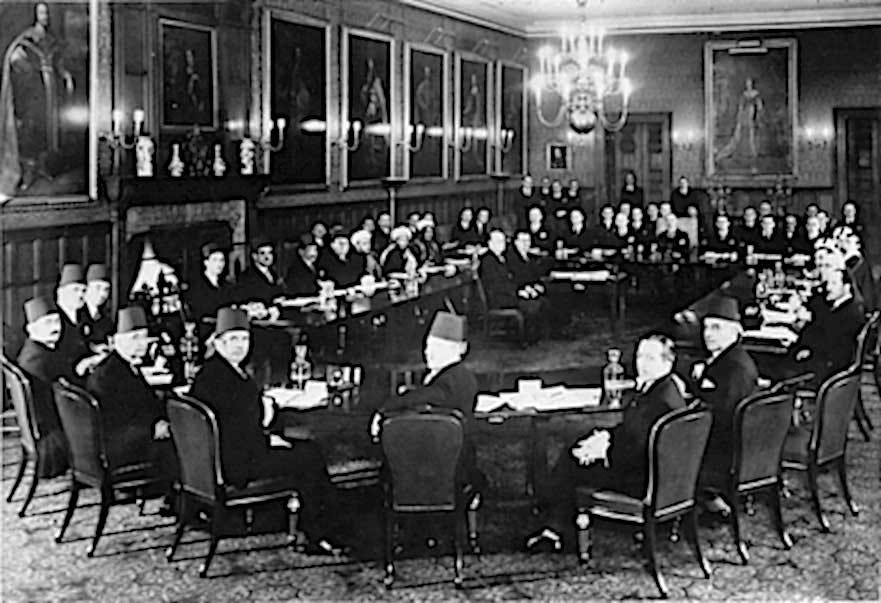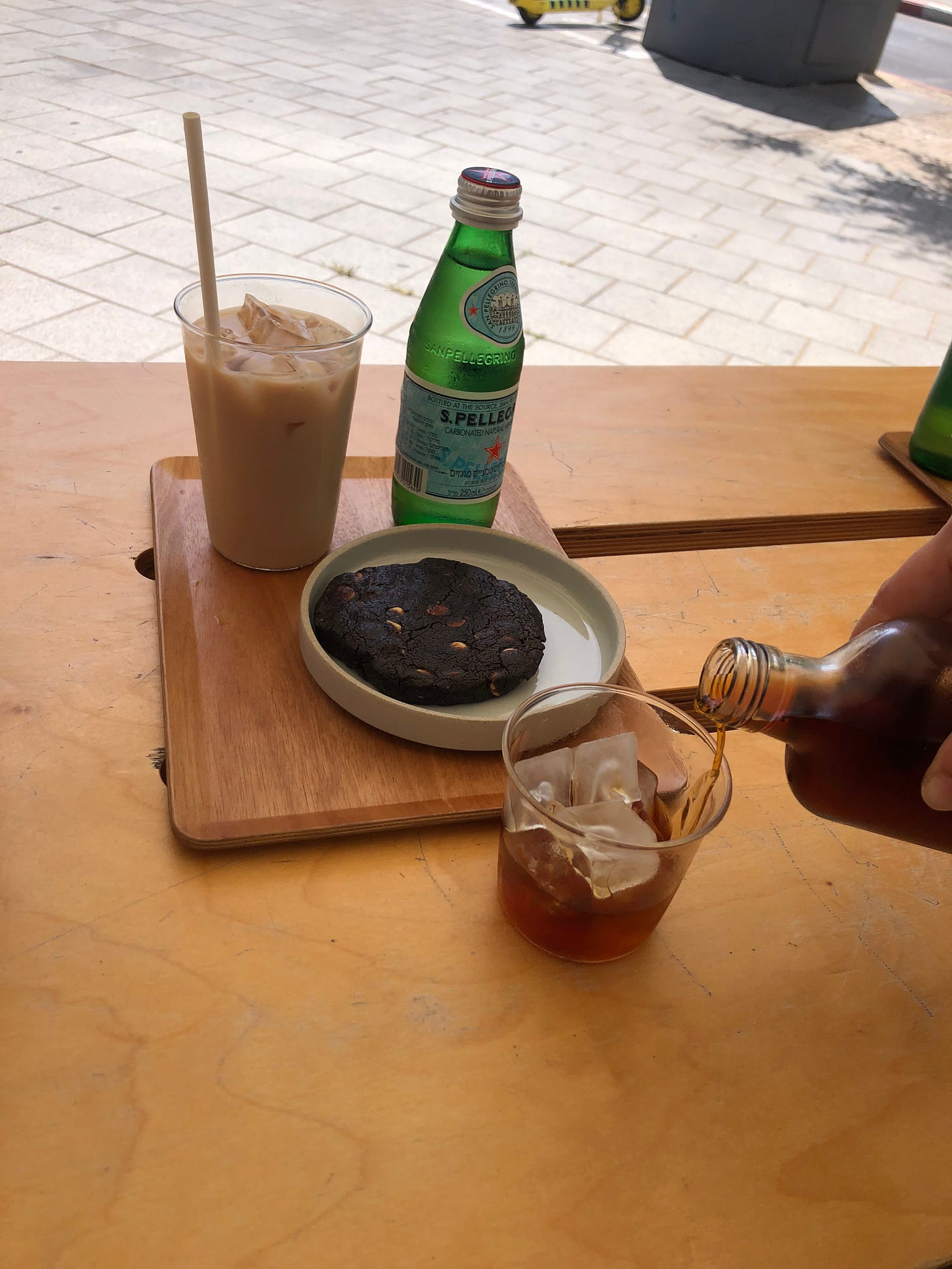Tel Aviv Diary February 17, 2023
Protest Continue to Rock Israel, Financial Effect of Judicial Reform, Terror Attack, History, and a Restaurant Review
PROTESTS, AGAIN
Over the past week, protests have once again taken center stage in Israel, with a growing sense of determination among demonstrators —despite the government's continued efforts to push through all of the judicial reforms that continue to face strong opposition. On Saturday night, around 100,000 protesters gathered in Tel Aviv, with many taking to the streets and marching onto the central Ayalon highway, blocking it for one hour. Similar demonstrations also took place in cities across the country, indicating widespread opposition to the government’s judicial “reform” plans.
The main event of the week in Israel took place on Monday, with a large demonstration in Jerusalem. While buses were available to transport protesters from Tel Aviv, I opted to take the train. Upon arriving at Tel Aviv’s Savidor station, I was met with a long line for security checks, and to my surprise, I received the disturbing notification that Israel's Transportation Minister had ordered the railroad not to add any additional train capacity heading to Jerusalem. However, my concerns were soon alleviated when an announcement was made confirming there was a special train waiting on track 4 with plenty of space. I managed to secure one of the last seats, and as the train made its way towards central Tel Aviv, the car quickly filled to capacity. At the last station in Tel Aviv, the train was so full that no one else could board
.
The ride to Jerusalem was an interesting experience, with passengers from every sector of society onboard — from couples in my age group, to families with young children who kept busy by coloring on the floor of the train. The train was filled with a diverse cross-section of Tel Aviv society. As we arrived in Jerusalem, the thousands of people on the train, and those that arrived moments after, made their way up the four sets of escalators to street level, chanting slogans in support of democracy.
As we exited the train station, the crowd marched together in the direction of the Knesset and the rally. Being among the tens of thousands of people at the demonstration, it was easy to believe that the crowds could halt the injustice that was taking place just a few hundred yards away. However, my heart's desire to believe in the impact of our actions was in conflict with what my head knew, which was the harsh reality of the situation
.
On Sunday evening, Israel’s President, Isaac Herzog, delivered a rare televised address to the nation. In his speech, Herzog called for open-minded negotiations on the coalition’s proposed judicial reforms. First and foremost, Herzog urged a halt to the legislative process. Unfortunately, the proponents of the changes were steadfastly unwilling to do so. Moreover, although coalition spokespersons publicly invited negotiations, they made it very clear they would only agree to minor changes — and none that would affect the essence of their plans.
Despite the standoff, talks about negotiations continue, with former Defense Minister Gantz adopting a slightly more conciliatory tone; while opposition head, Yair Lapid, has taken a harder line, being skeptical that much can be accomplished. The stark divide between the two sides shows the difficult road ahead. It remains to be seen if any meaningful progress can be made.
BANKING PROFESSIONALS AGAINST THE PROPOSED JUDICIAL REFORMS
This week, the leading executives of Israel's banks met with Finance Minister Smotritch and expressed concern that the proposed judicial changes would have disastrous effects on the economy. Bank executives warned that customers looking to open accounts overseas had increased ten-fold during the past four weeks; and reports indicate that $4 billion has been withdrawn from Israeli banks during this same time.
In response to these concerns about judicial reform, Smotritch's response was perceived by many as somewhat absurd — Smotritch asked where the bank leaders were during the withdrawal from Gaza (the Hitnatkoot). Although some members of the right-wing have made similar statements about the court's failure to intervene in government decisions (like stopping the Gaza withdrawal), insistence on drawing parity between these two actions remains a point of confusion for many.
However, after speaking to the daughter of a close friend who is part of the religious Zionist community, I gained some insight into the matter. She explained to me how deeply traumatic the pull-out from Gaza and the removal of settlers from their homes was for the religious Zionist community. Even those who are too young to remember the event themselves are taught about the withdrawal, and as such, the ordeal remains a significant part of their cultural and religious identity. While the connection between the disengagement that took place 18 years ago and the current situation regarding the judicial reforms may not be immediately obvious, it appears to be emotionally and psychologically linked for some members of the community, which at times seems to cloud their judgement.
SECURITY PROFESSIONALS AGAINST THE PROPOSED JUDICIAL REFORMS
Recently, 400 former heads of the security services and high-ranking officers penned a letter to President Herzog, urging him not to sign the proposed legal reform bills. While Herzog's signature is considered a formality, in the current political climate, nothing can be taken for granted. Despite growing opposition, it appears that little is making a difference. Even if former Prime Minister Netanyahu is having second thoughts about the reforms, he is under immense pressure to push forward. Yariv Levin, architect of the reforms proposal, has reportedly warned that he will bring down the government if the judicial reforms are not implemented, in full.
In the meantime, head of Yahadut HaTorah has demanded the immediate passage of the Supreme Court “Override Clause”. Without it, the ultra-Orthodox community will not be able to receive a larger portion of the budget, which they believe they deserve.
TERROR
In the midst of the ongoing political crisis in Israel, terror attacks continue to plague the country. Last Friday, a Palestinian terrorist from East Jerusalem drove his car into a group of Israelis waiting at a bus stop in the Ramot section of Jerusalem. The attack resulted in the tragic deaths of two young brothers, while their father sustained serious injuries.
In response to the attack, Minister of National Security Itamar Ben-Gvir declared the launch of “Chomat Magen 2,” a military operation that had no clear objective or plan on Sunday. The first Chromat Magen was a major military action during the Second Intifada to regain control of some of the Palestinian cities. Despite Ben-Gvir’s lack of preparation and planning, the government was compelled to allow the police to start a crackdown in East Jerusalem. The police focused on zoning infractions, outstanding tickets, and other minor matters.
These actions, coupled with other aggressive measures taken by Ben-Gvir, led the head of the Security Services (Shin Bet) to warn the minister that his actions could lead to a large-scale Intifada. Furthermore, in response to Ben Gvir's criticism of the police's handling of last week's demonstrations in Jerusalem, the police commissioner sent a letter to all officers, emphasizing the importance of protecting the right to peaceful protest.
In response to the terrorist attacks, the new government approved plans for 10,000 new housing units and legalized nine illegal settlements in the West Bank. These actions were met with condemnation from the US and Western European countries. Finance Minister Bezalel Smotritch responded by saying that everyone should get used to it, as all settlements will eventually be legalized.
FOREIGN AFFAIRS
In another development, Israel's Foreign Minister, Eli Cohen, visited Kiev on Thursday and met with Ukrainian President Volodymyr Zelensky. During the meeting, Cohen pledged additional support for Ukraine, including a full-scale civilian warning system (similar to what Israel has), to be implemented within the next three months. Additionally, Israel will provide loan guarantees to Ukraine. The two leaders also discussed joint action against Iran, which supplies arms to Russia on the international stage. It is possible that Israel is doing more to help Ukraine than what has been publicly announced
.
ECONOMY
Israel's GDP grew an impressive 6.5% in 2022. Its GDP per capita increased by 4.4%, surpassing the OECD average of 2.6%. However, the economy cooled somewhat in the last quarter, leading to a decline in both exports and imports. Meanwhile, the inflation rate in 2022 was 5.3%, the highest number since 2008.
The Israeli housing market has finally cooled, with a 36% drop in the number of apartments sold in January compared to the previous year. According to the Finance Ministry's statistics, developers currently have an inventory of 53,542 unsold apartments, the highest number recorded.
BUSINESS
MID Health, which has developed an AI-powered platform to manage patients' health and medication, raised an additional $20 million. The funding round was led by Intel Capital, with participation from Maverick Ventures Israel and existing investors Hanaco Ventures, Welltech Ventures, Arc Impact, Basad Ventures, Fresh.Fund, and JumpSpeed Ventures.
Ledge raised $9 million in a seed round led by New Enterprise Associates. The company has a platform to automate a company's payment system.
Cybersecurity startup Descope announced on Wednesday that it raised $53 million in seed funding and launched its new authentication platform. The company was founded in 2022 by a team of serial cybersecurity entrepreneurs who previously founded Demisto.
A PIECE OF HISTORY — THE SAINT JAMES CONFERENCE
After the British government rejected the Peel Commission’s plan for the creation of Jewish and Arab states in Palestine, they decided to hold a conference between the Arabs and Jews to determine the future of the region. The Jewish delegation, led by Chaim Weizmann, and the Arab delegation, composed of followers of the Mufti of Jerusalem and more moderate leaders from the Arab National Defense Party of the Nashshibis, met separately—since the Arabs refused to recognize the Jewish Agency. The British proposed the establishment of an independent Arab state, after admitting an additional 75,000 Jews into the country as a basis for negotiation. However, the Jewish delegation rejected the proposal, viewing it as a negation of the Balfour Declaration. The Arab delegation also rejected the British plan. The conference lasted from February 7 to March 17, 1939, but disbanded without any progress. The British announced that if they couldn't get the opposing sides to agree, they would unilaterally impose their own ideas, which they did through the subsequent White Paper
.
A TASTE OF TEL AVIV— HOUSE OF COFFEE
RESTAURANT REVIEW, by Tali Schulman
Have you ever wondered where you can get a perfectly executed iced chai latte in Tel Aviv? If you answered yes, this week’s highlight is the place for you. House of Coffee (or HOC, as it is best known) is perfectly nestled between the bottom of Shuk HaCarmel and Neve Tzedek. Their mission is to bring a unique coffee experience paired with a minimalist design to the streets of Tel Aviv — and in my opinion, they do this perfectly. The menu consists of a variety of coffee beverages, matcha, and of course their chai latte paired with fantastic pastries—and my personal favorite, the fluffiest egg sandwich you will ever see. Stop by to pickup a drink to go, or have a seat and enjoy their curated atmosphere. Either way, you will be sure to enjoy!
For more Tel Aviv restaurant recommendations, you can find me on Instagram @talischulman where I save all my food adventures in my highlights




